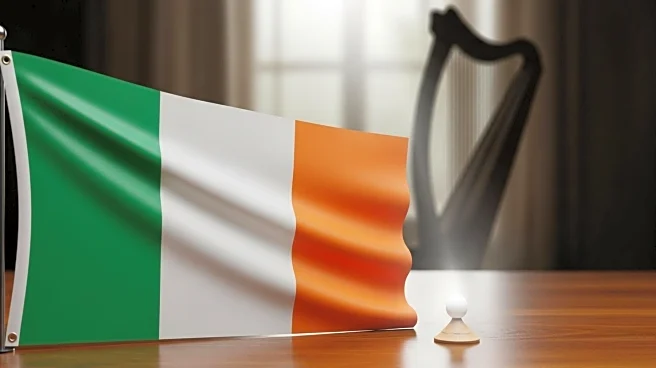What's Happening?
Colum Eastwood, former leader of the Social Democratic and Labour Party, has announced he will not be running in the upcoming Irish presidential election. Eastwood, who is currently serving as the Foyle MP, had considered entering the race as an independent candidate after being approached to put his name forward. However, after consulting with colleagues over the summer, he decided it was not the right time for him to pursue the presidency. Eastwood expressed concerns that Irish unity was not a priority for the candidates announced at the time. The presidential race is beginning to take shape with major parties like Fianna Fáil and Fine Gael close to selecting their candidates, leaving little room for independents to mount a serious challenge.
Why It's Important?
Eastwood's decision not to run highlights the challenges faced by independent candidates in the Irish presidential race, where major political parties dominate the field. His concerns about Irish unity not being prioritized by other candidates may resonate with voters who share similar views, potentially influencing the platforms of those who do enter the race. The endorsement of Jim Gavin by the Taoiseach as the Fianna Fáil candidate suggests a focus on candidates with strong public profiles and non-partisan appeal, which could shape the dynamics of the election. The race's outcome could impact Ireland's political landscape, particularly in terms of how issues like Irish unity are addressed.
What's Next?
As the election approaches, Fianna Fáil and Fine Gael are expected to finalize their candidate selections, which will further define the competitive landscape. Sinn Féin is also likely to enter the contest, adding another dimension to the race. The final lineup of candidates will be crucial in determining the focus of the election debates and the issues that will be prioritized. Independent candidates and those from smaller parties will need to strategize effectively to gain traction in a race dominated by larger political entities.
Beyond the Headlines
The Irish presidential election serves as a reflection of broader political trends and societal priorities within Ireland. The emphasis on candidates with non-partisan appeal, like Jim Gavin, suggests a desire to position the presidency above traditional political divides. This approach may influence future elections and the role of the presidency in Irish politics. Additionally, the focus on Irish unity as a campaign issue could have long-term implications for Ireland's relationship with Northern Ireland and its approach to national identity.









